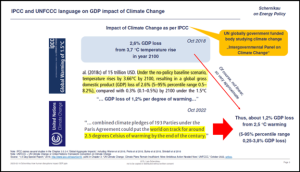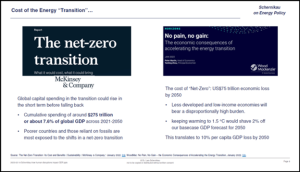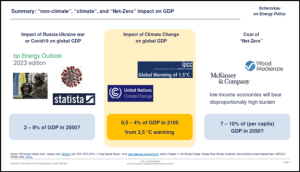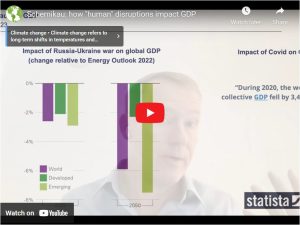How Human Disruptions Impact Global GDP
Resource Brief by Kip Hansen — 29 March 2023
Dr. Lars Schernikau, energy economist, entrepreneur, commodity trader and author of the recent book “The Unpopular Truth…about Electricity and the Future of Energy”, has produced a very informative and insightful short YouTube titled “How ‘Human’ Disruptions Impact GDP”.
“Human Disruptions”? — Like the Covid Pandemic and governmental responses to it. Like the war in the Ukraine. Like governmental efforts to reduce CO2 emissions and restrict the use of fossil fuels. Like “NetZero”.

These are not “climate” questions per se, but economic questions that need answering from the knowledge base that is World Economics and Energy Economics.
Lars Schernikau is one of those people with the depth of understanding necessary to address these issues and communicate what it all means to us.

In this 15-minute YouTube lecture, given over a professional slide deck of illustrations and quotes, Schernikau uses data and projections from the IPCC, Nobel Prize winner William Nordhaus (Nordhaus 2018), Kahn et al. (2021) and other studies, comparing their projections with comments and exploring the possible and probable economic outcomes of the already-underway “NetZero” transition.

I don’t want to include a spoiler here, as you should really dedicate a quarter hour to this YouTube, I can tell you that Schernikau shows that regardless of future climate scenario, regardless of climate sensitivity, and regardless of climate actions or inactions:
The outcomes, in regards to Global GDP, are better than you think.
Here is the presentation:
# # # # #
Author’s Comment:
This presentation is well-worth the 15 minutes it takes to watch it, though you may wish to pause the video often to take a closer look at some of the slides.
We see a lot of details here at WUWT on climate sensitivity and various projections of future temperatures, but seldom see anything on the actual effects on the overall economy – and it is the overall economy that reflects the conditions of human societies. Better economic conditions generally mean better lives, especially at the lower ends of the economic range. The biggest improvements to marginal societies come with the ratcheting up of basic standards of living – which depend on decent paying jobs and education.
Thanks for reading – hope you have checked out Schernikau’s presentation. The slide deck can be accessed directly here.
This commentary was first published at Watts Up With That? March 29, 2023, and can be accessed here.
CO2 Coalition Member Kip Hansen is a science research journalist and contributing expert on sea level and sea-level rise. Hansen is a prolific author of numerous articles on the subjects. He contributes commentaries and articles regularly to Watts Up With That?

